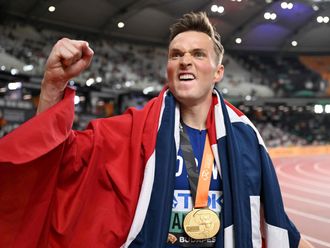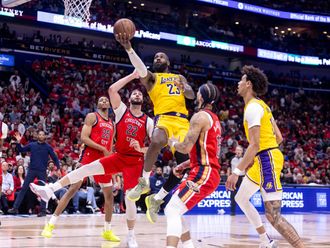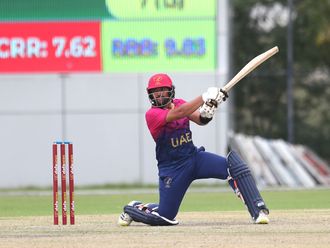London: How badly does track and field need Usain Bolt? Here’s a little example: when Bolt visited German physician Hans-Wilhelm Muller-Wohlfahrt, after skipping a meeting in his native Jamaica, for a little bit of work on his strained back, the entire country felt a little sore.
Similarly when Bolt was disqualified after a false start at the previous World Championships in Daegu, South Korea, he took up more news and air time in his absence than even his fellow countryman Yohan Blake who went on to win the event. The Jamaican proved to be the biggest newsmaker in a world event by simply not running.
Even fellow athletes were shocked and empathised. American Tyson Gay, who was injured and sitting in the stands that day, commented on having ‘the air ripped out of me’.
Veteran sprinter Kim Collins from Saint Kitts and Nevis was reported to have said: “In fairness to the people of the world, they want to see [Bolt]. The show must go on. One simple mistake and he’s gone.”
Bolt’s exit also sent International Olympic Committee (IOC) officials scurrying into their meeting rooms to try and review the false start rule.
Since that meeting, the false start rule has been accorded a few modifications in order to ensure that athletics’ most valuable equity may now be able to twitch any muscle he wants when in the starter’s “set” position, just as long as his fingers do not cross the line. That is called influence.
This should work fine for Bolt, who sat down with his coach Glen Mills (he has the added headache of also training Yohan Blake, the man now threatening to take Bolt’s crown) after his infamous exit in Daegu and tried to work out the permutations and combinations of how to tackle this problem should it occur in the future.
Mills’ diagnosis was simple, according to Bolt, who spoke to a group of at least 300 members of the media persons on Thursday. “My coach told me that my starts have never been my strength anyway. Therefore, it was pointless to focus on them. I am over that start (in Daegu) and now I am simply trying to focus on the best start I can get.”
In the 100 metres the start is almost everything. It is the ticket to the gold. Nine out of ten athletes will affirm that it is the perfect opening to the most glorious ending. The few vital seconds in the middle of the race is a process called deceleration. Whoever decelerates faster gets to map out the finish. In Bolt’s case, however, his deceleration times are simply mind-numbing, meaning that somewhere from the 50-metre mark he begins to ‘walk down’ his rivals. This is where Bolt begins to unpack his superhuman qualities.
A slow-starting Bolt can still power home as the winner. That’s how badly track and field needs Bolt.
It was a guarded, but self-assured, Bolt who turned up for his much-publicised press conference on Thursday. It appeared he was self-aware that his status as athletics’ leading comet was somehow going to hinge on this Olympics.
“What do I want to be?” he repeated when asked. “Man, I want to be a legend. Full stop. That’s what I want to be.”
But Bolt’s back-to-back defeats in the 100 and 200-metres, against training partner Blake, during the Jamaican Olympic trials have suddenly thrown up questions about his mortality.
“That was a wake-up call. I have been working on a few things and we are all going to see it on the day, so I am alright,” he attested.
There were observations that, following that misadventure, Bolt and his coach opted to train in private (he is known to train regularly with countryman Blake) to assess the motives behind his fallibility. Injuries didn’t help either, slowing down the process of mental and physical recovery.
“I did have a few problems but I have been training and I am ready to go. My coach finds it better for me not to train in front of the cameras. He feels that it is distracting for me. He believes that my training schedules should be private and keeps the attention away from me. The aim is to relax myself,” he said.
The objective, according to Bolt, is simple: “It is to win here now. Since I am here. That’s the main focus for me. I am ready to go now and that’s my goal.”
The question of losing the title, however, could not be more pertinent. Everything does not appear to be quite right and there seems to be an indication that the man who wants to be a legend is also being economical with the truth about his condition.
“I don’t think it will be the end of the world (if I lose),” confessed Bolt. “But for me coming into a championship I am not going to think about this at any point of time. I have put everything behind me. I know I have trained to be a champion and I have been in this stage a couple of times so I know what it takes. I know the competition and I know that I am capable. I have also been trained never to use the word ‘if’.”
Who would have ever imagined that the most unbeatable star in athletics’ firmament would have to contend with questions of defeat? Bolt is striving for immortality and to attain that there is a very heavy price to pay.
The question of him being certified as an icon, at only 25, will be addressed in the matter of less than 10 seconds when the world’s best athletes line up for the men’s 100-metre final in London. The sprained hamstring just needs to hold up for those vital seconds.
The sprint, however, is not the only canvas upon which Bolt wants to paint pictures of his ambitions. He wants to add the 200-metres as well as the men’s 4x100m relay where it’s believed a world record could be on the cards.
“Hands down,” said Bolt. “I think this could easily be one of the fastest 100 metres anybody has ever seen. Some of the other guys have been clocking some good times. They have shown that they are capable of going fast.”
In terms of per centages, however, it is being discussed that, while Bolt is still very fast, he has slowed down fractionally. The statement may be a contradiction in terms, but it points to the fact that some of the other athletes like Blake, Justin Gatlin and Gay have suddenly found their groove and in order to beat them Bolt needs to be just that faster.
The answer lies somewhere in the realms of applied science, but not with Bolt. His reasoning is simple. “I have heard of 9.5 seconds and 9.6 seconds because those are times that I have run. And I can tell you that I run fast. I am not going to worry about science and I don’t listen to what science tells you.”
When asked by Gulf News who he thought could be the one man to beat on the day, Bolt replied: “You are racing against the clock and against the other seven runners next to you. You have to keep to your lane and that’s it. You cannot think of one person because all the athletes have been training hard and those are the people you have to beat.”
The immensity of Bolt’s impact on athletics can be assessed by one fundamental truth in track and field — he has taken his performances as an athlete to the realms of art. The longer they live in public memory the higher its value.
However, there is still the small matter of the men’s 100 metres in London. The public can be assured that whoever crosses the finish line first, the race will have been won or lost by Bolt.











